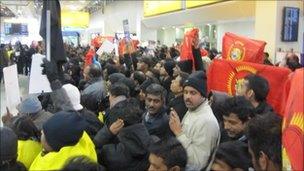Sri Lanka government calls opposition MP a 'traitor'
- Published

President Rajapaksa's visit to the UK drew strong protests from UK Tamils
Sri Lanka's government has called a senior opposition leader a "traitor" after he wrote an article saying that the country should investigate "the many allegations against us".
A no-confidence motion is planned against the deputy leader of the United National Party (UNP), Karu Jayasuriya.
Officials say there are also plans to investigate a second UNP lawmaker.
Government MPs have accused him of helping organise protests in the UK against President Mahinda Rajapaksa.
The move comes after the prestigious Oxford Union suddenly cancelled a planned speech by Mr Rajapaksa.
The union said large demonstrations planned against the Sri Lankan president would have posed security problems.
The Sri Lankan government said those demonstrating against his presence in Britain were extremists bearing the flag of the Tamil Tiger militants.
In his article printed in Sunday newspapers, Karu Jayasuriya said that, since the end of the war last year, Sri Lanka had been dogged by allegations of "massive civilian casualties" and disregard for human rights.
He said that, instead of responding, the government made "wild claims about international conspiracies".
Mr Jayasuriya said Sri Lanka's good name could only be restored if it investigated such allegations and took steps to address "the just claims" of the [Tamil] minority.
This, he said, would diminish the credibility of anti-government protesters overseas.
In response, government spokesman and Information Minister Keheliya Rambukwella said that "only a traitor can resort to this type of betrayal".
He called Karu Jayasuriya's statement "an outcome of a conspiracy" and said that the opposition party had tarnished its image "through terrorism".
Another minister, Maitripala Sirisena, said the government would now be identifying "patriots and traitors" in the country and would act accordingly.
When Mr Jayasuriya rose to address parliament on Wednesday he was shouted down by government MPs and the session was temporarily suspended.
Meanwhile, the government is also seeking to discipline another UNP MP, Jayalath Jayawardena, by launching a parliamentary investigation into his activities.
Conspiracy charge
Mr Jayawardena attended a meeting in the UK's House of Commons last month, organised by a multi-ethnic group of Sri Lankan expatriates, avowedly aimed at promoting ethnic reconciliation.
But a Sri Lankan government minister, Wimal Weerawansa, accused him of "conspiring against the government with the Tamil Tigers" by attending the gathering.
The government said he helped organise the anti-Rajapaksa protests in Britain - something Mr Jayawardena has strenuously denied.
Government parliamentarians tried to manhandle him in the parliamentary chamber last week.
Sri Lankan ministers have described the cancellation of the Oxford Union event as an insult to the president and said the UK should have outlawed the protests against him given that the UK had had the Tamil Tigers on its list of banned organisations since 2000.
They said Mr Rajapaksa was denied the right to freedom of speech.
The Sri Lankan government's critics say that the Rajapaksa government itself denies its domestic critics the right to free expression.
Since the Oxford cancellation, ministers and pro-government commentators have been denouncing the UK.
Last Friday, Mr Weerawansa led a demonstration outside the British High Commission in Colombo.
- Published18 November 2010